Coronavirus Australia live news: Three UK virus cases linked to Australian Open
A super-infectious mutant strain of COVID-19 has been reported in three people linked to the Australian Open.
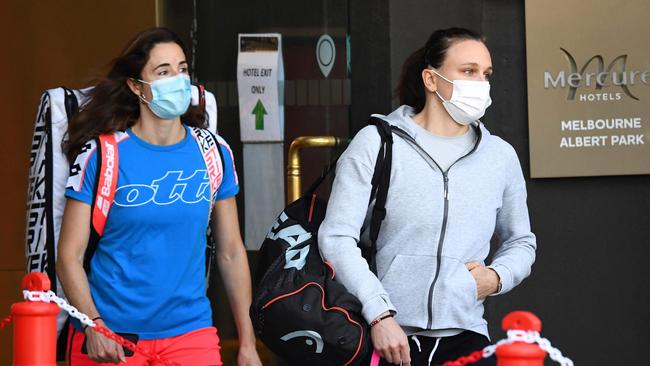
- New UK variant ‘may be deadlier’
- Badosa mea culpa after positive test
- Olympic officials pin hopes on vaccine
- Glimmer of hope for tourism industry
- Too early to draw conclusions from Wuhan: WHO
- Three UK virus cases linked to Australian Open
That concludes today’s live coverage of the coronavirus crisis. Here’s how the day unfolded:
A super-infectious mutant strain of COVID-19 has been reported in three people linked to the Australian Open. The World Health Organisation says it is too early to draw conclusions from its mission to Wuhan to investigate the origins of the pandemic.
Joe Kelly 8.30pm: Government signals more assistance for tourism sector
Tourism Minister Dan Tehan has opened the door to targeted financial support for tourism businesses exposed by the loss of international visitors during COVID-19.
But he has asked the sector to justify any further assistance with hard evidence and provide ideas on how it could be delivered.
Mr Tehan said the reopening of international tourism was still at least nine months away but was hopeful of establishing travel bubbles in the interim with New Zealand, Singapore and other Pacific nations.
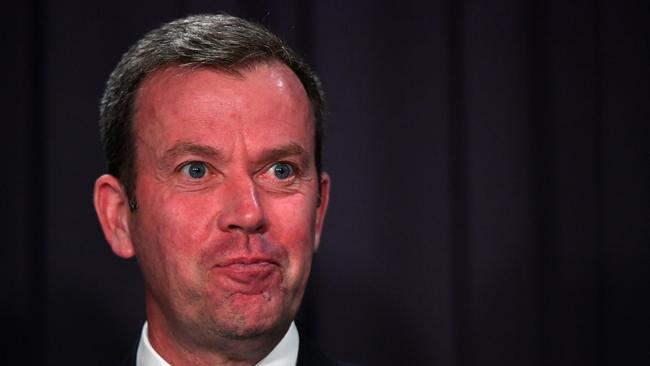
“That would give us some opportunity to open up Australia to international tourism, but the most likely scenario is that we are probably nine to 12 months away from international tourism as we know it restarting and it could be not until this time next year. So it’s a very challenging time,” he said
Read the full story here.
Heath Parkes-Hupton 8.00pm: Pandemic offers ‘once-in-a-generation chance to reset
The head of a top Australian university has told a summit of world leaders the COVID-19 pandemic offers a “once-in-a-generation” chance to reset industry and the economy as we face an even bigger fight – climate change.
Professor Brian Schmidt says governments must harness the renewed trust science has gained for guiding people through the virus crisis in order to head off catastrophic global warming.
Professor Schmidt, vice-chancellor and president of the Australian National University, delivered a keynote speech at the Climate Adaptation Summit 2021 in the Netherlands.
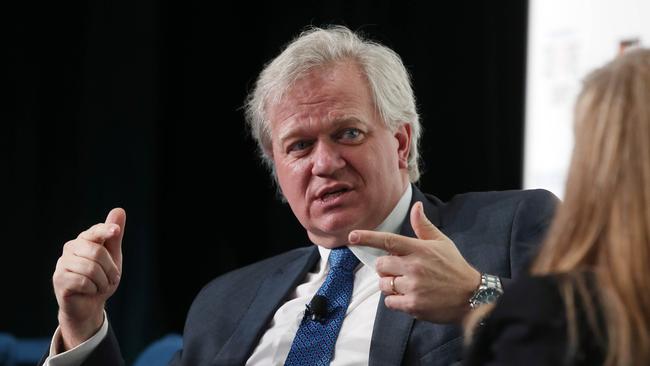
The summit – attended by the likes of billionaire Bill Gates, and heads of state Boris Johnson, Angela Merkel, Emmanuel Macron and Justin Trudeau – is an online global conference aimed at stepping up the world’s efforts in adapting to changing climates.
Professor Schmidt said the coronavirus pandemic revealed “just how brittle our environment is” but that the skidding stop the economy came to offered a “once-in-a-generation opportunity to reshape our world” through smart investment
Read the full story here.
Staff Writers 7.05pm: Three UK virus cases linked to Australian Open
A 10th person connected to the Australian Open has tested positive for COVID-19.
The new case, a male in his 20s, was confirmed on Saturday night by COVID-19 Quarantine Victoria (CQV). He is not a player.
CQV said in its latest update three previously reported positive cases linked to the tennis tournament were found to be infected with the UK mutant coronavirus strain.
Two of the men are aged in their 30s and one in his 50s, and all are not players.
CQV said they arrived in Melbourne on a dedicated Australian Open charter flight on January 15 and returned their first positive tests on January 15, 17 and 18.
“All three cases have been in hard lockdown since they landed in Melbourne,” a CQV spokeswoman said.
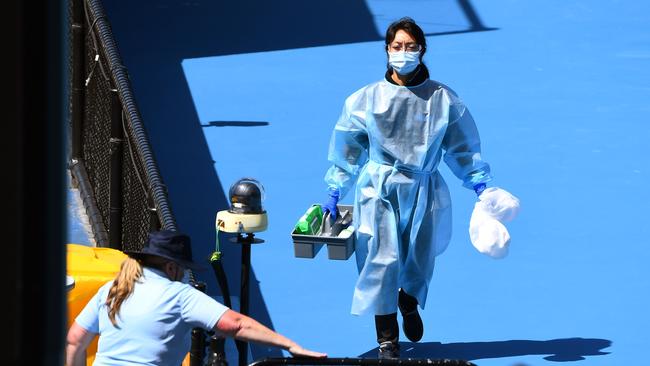
It comes as Victoria recorded no new local coronavirus cases overnight, with three cases recorded in hotel quarantine.
It marks the 17th consecutive day of no local transmission of the virus in Victoria.
The number of active cases in Victoria is 33, made up of one locally acquired case linked to the Black Rock restaurant cluster.
READ MORE: Tennis star changes mind on quarantine after positive test
AFP 6.40pm: Hong Kong orders two-day virus lockdown
Thousands of Hong Kongers were ordered to stay in their homes on Saturday for the city’s first coronavirus lockdown as authorities battle an outbreak in one of its poorest and most densely packed districts.
The order bans about 10,000 people living inside multiple housing blocks within the neighbourhood of Jordan from leaving their apartment until all members in the area have undergone testing and the results are mostly ascertained.
Officials said they planned to test everyone inside the designated zone within 48 hours “in order to achieve the goal of zero cases in the district”.
“Residents will have to stay at their premises to avoid cross-infection until they get their test results,” health minister Sophia Chan told reporters on Saturday.
The government had deployed more than 3,000 staff to enforce the lockdown, which covers about 150 housing blocks.
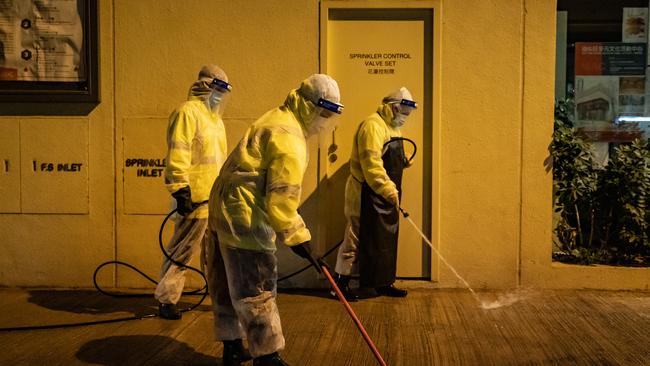
Hong Kong was one of the first places to be struck by the coronavirus after it spilled out of central China.
It has kept infections below 10,000 with some 170 deaths by imposing effective but economically punishing social distancing measures for much of the last year.
Over the last two months the city has been hit by a fourth wave of infections, with authorities struggling to bring the daily numbers down.
Stubborn clusters have emerged in low-income neighbourhoods notorious for some of the world’s most cramped housing.
READ MORE: Olympic officials wait on vaccine
Steve Zemek 5.55pm: Virus alerts in three Queensland areas
Three regional Queensland communities are being asked to be on alert after COVID-19 fragments were detected in sewage.
Queensland health said routing wastewater testing had discovered viral fragments at sites in Townsville, Rockhampton and Nambour, on the Sunshine Coast.
Queensland chief health Officer Dr Jeannette Young said the samples were taken on January 12, 18 and 19.
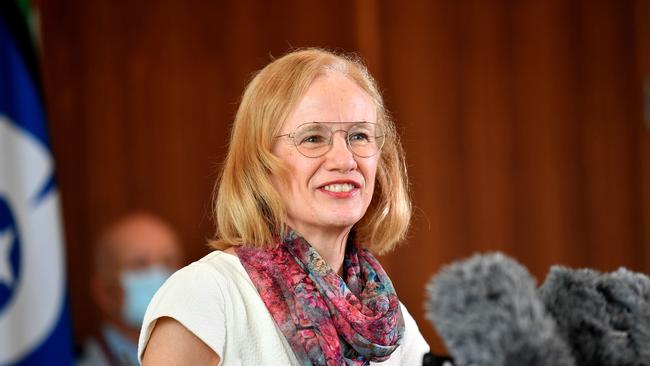
She said while the results were a cause for vigilance, they did not necessarily mean that there were undiagnosed cases in the community.
“A positive sewage result means that someone who has been infected or is currently infected, is shedding the virus,” Dr Young said.
“Infected people can shed viral fragments and that shedding can happen for several weeks to months after the person is no longer infectious.
“This does not necessarily mean we have new cases of COVID-19 in these communities.”
Read the full story here.
Ellie Dudley 5.45pm: Sri Lankan health minister tests positive
Sri Lanka’s health minister, who has previously endorsed sorcery and magic potions to stop the country’s surging coronavirus infections, has tested positive and will self-isolate, officials said on Saturday.
Pavithra Wanniarachchi consumed and endorsed a magic potion last year, later revealed to have been manufactured by a sorcerer who claimed it worked as an inoculation against the virus.
The health minister also poured a pot of water into a river in November, after a self-styled god-man told her that it would end the pandemic, according to an AFP report.
The island with a population of 21 million on Friday approved the emergency use of the AstraZeneca vaccine only hours after Ms Wanniarachchi tested positive.
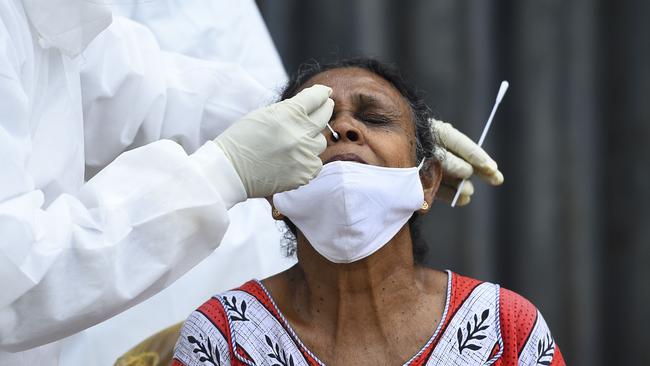
“Her antigen test returned positive on Friday and she has been asked to isolate herself,” a health ministry official said.
“All her immediate contacts have been quarantined.”
A junior minister who had also taken the potion made popular by Wanniarachchi tested positive for the virus earlier this week.
READ MORE: Virus fears continue for 67 Sydney suburbs
Ellie Dudley 5.00pm: Virus sleuths the unsung heroes of the past year
Virus detectives are the unsung heroes of the past 12 months — thousands of lab technicians, contact tracers and epidemiologists racing against the clock to stay ahead of the pandemic.
Contact tracers from NSW Health have made more than 228,000 phone calls since March as they try to track the source of the latest infections.
It can be an awkward moment, telling someone they’ve been exposed to the virus, sometimes more difficult still extracting precise information about whom they’ve been with over the past few days.
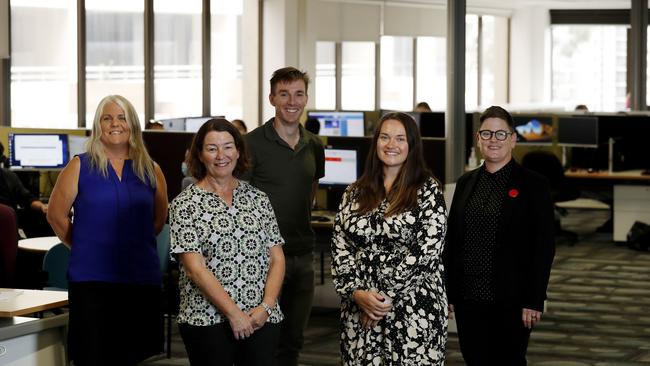
From unfaithful spouses to migrants working illegally to children hiding secrets from their parents, the team has to build trust with a stranger on the end of the phone to obtain necessary details of their movements in the previous 14 days. Every minute an infected person goes undetected increases the danger of a wider outbreak.
Read the full story here.
Ellie Dudley 4.10pm: Too early to draw conclusions from Wuhan: WHO
The World Health Organisation has said it is too early to draw any conclusions from its mission to Wuhan as to whether the coronavirus pandemic originated in China.
A team of WHO experts arrived in Wuhan on January 14 to start investigations into the beginnings of the virus, more than a year after the first cases were detected in the city.
Having now completed a two-week quarantine, the investigation is now underway. Beijing has insinuated that the pandemic started outside of its borders, despite a widespread understanding that it started within the country.
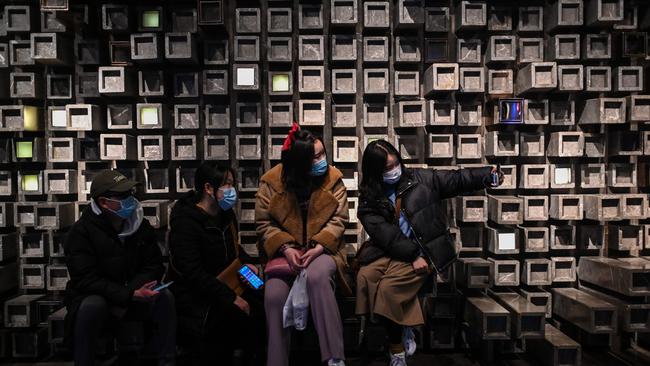
“All hypotheses are on the table. And it is definitely too early to come to a conclusion of exactly where this virus started, either within or without China,” said WHO emergencies director Michael Ryan.
“There are different... scientific observations in different parts of the world... all of that is very important, because it builds up a picture,” he told a press conference in Geneva.
However, he added: “This is a big jigsaw puzzle and you cannot tell what the image says by looking at one piece in a 10,000-piece jigsaw puzzle.”
The virus has killed more than two million people so far, been contracted by tens of millions of others and taken a massive toll on the global economy.
“Let’s step back, let’s follow the evidence, let’s follow the science. Our team are on the ground, they are having a good experience working with our Chinese colleagues. We are working through the data,” said Mr Ryan.
READ MORE: PM ‘open’ to camps quarantine proposal
Ellie Dudley 3.30pm: New travel ban for Belgium to curb new strain
Belgium will ban non-essential trips in and out of the country from Wednesday, in the hopes of stopping the spread of highly transmissible coronavirus variants.
The travel ban will run to March 1 and apply to land, sea and air travel but will not affect cross-border workers or those with overriding health or family reasons.
“We are not going to build a wall around Belgium. We can go to other countries but only for essential reasons,” Prime Minister Alexander De Croo said on Friday.
The announcement comes a day after a European Union summit by videoconference during which leaders decided against barring travel across the EU’s internal borders, the AFP reported.
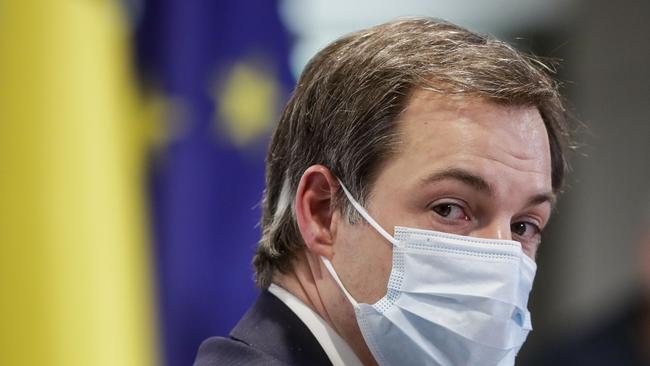
They instead “strongly discouraged” non-essential intra-EU trips, and warned they might toughen that line in days ahead if the worrying virus variants took hold.
The EU wants to avoid a repeat of the height of the pandemic’s first wave in March last year when several member states panicked and closed off national borders unilaterally, triggering travel and economic chaos.
Travel into the EU is already severely restricted.
The European Centre for Disease Prevention and Control has warned there is a “very high” probability of the more contagious variants spreading in the bloc.
These mutations -- which emerged in Britain, South Africa and Brazil -- have already prompted bans or restrictions on travellers from those countries.
READ MORE: There are advantages to being divided right now
Ellie Dudley 3.05pm: Nearly 300,000 travel permits issued to Victorians
The Victorian government has released data on the amount permits issued from people to travel interstate.
Since the portal went live on 11 January, 294,317 permits have been issued.
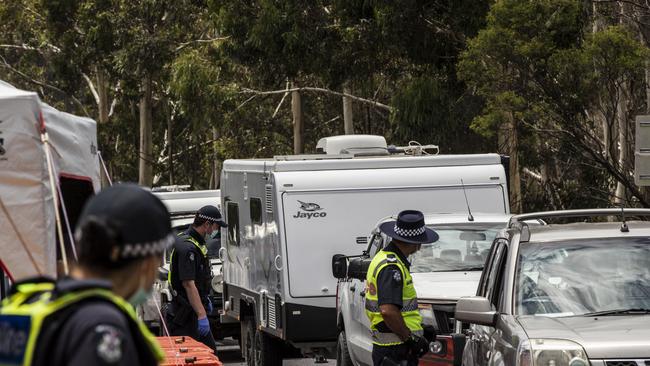
A total of 24,945 applications have been processed in the past 24 hours, averaging to 17.3 permits issued each minute
READ MORE: Melbourne is back better than ever after a rough trot
Ellie Dudley 2.45pm: US Centre for Disease Control supports delay of second dose
The United States Centre for Disease Control have said it is okay to delay the second dose of the COVID-19 vaccine for up to six weeks after the first injection, which for some of the vaccines would be twice as long as recommended.
The Pfizer/BioNTech and Moderna vaccines are given in two doses three and four weeks apart respectively, but the CDC said on Friday health providers could give the second dose up to six weeks after the first if unable to adhere to the stipulated time frames.
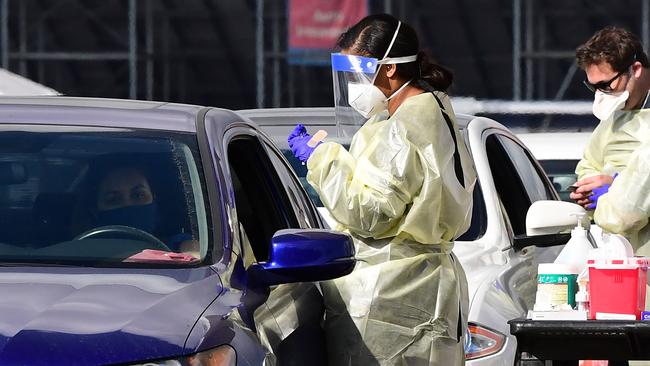
There is limited data on the efficacy of the vaccines beyond six weeks, the agency said.
Second doses shouldn’t be scheduled earlier than the recommended intervals, but they can be given within a grace period of four days earlier than the recommended date, they added.
Given the limited vaccine supply around the world, adjusting the schedules of doses has been scrutinized and been subject to debate by vaccine experts and other scientists.
READ MORE: Footy stars purely focused on the finish
Wayne Smith 2.25pm: Cate Campbell to swim on if Tokyo Games cancelled
Even though she is thinking of little else this year but the Tokyo Games going ahead in July, Australian swimming team spearhead Cate Campbell has said she almost certainly would extend her career an extra three years to the 2024 Paris Olympics if the Japanese event is abandoned.
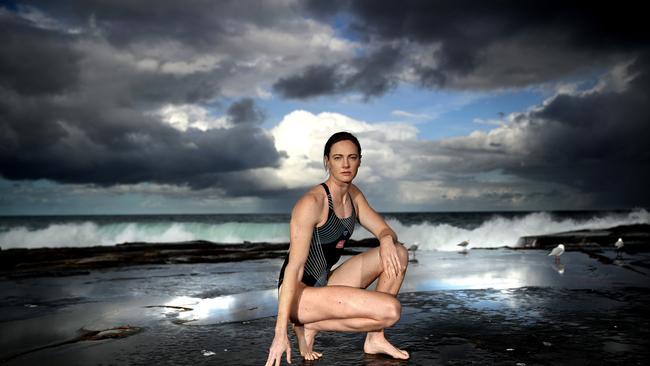
As things stand, the postponed Olympics are going ahead this year but Swimming Australia president Kieren Perkins revealed to The Weekend Australia that his organisation had begun investigating what kind of alternate event could be staged for the Dolphins team if the Games are called off.
Campbell, 28, who is aiming to lead Australia to a third consecutive gold in the 4x100m freestyle relay in Tokyo, has not deviated from her Plan A for the Tokyo Games – the Olympics are going ahead, come what may.
Read the full story here.
Jade Gailberger 2pm: Now China claims ‘Covid traces’ on Australian cherries
Australian and Chilean cherry exports have again under the microscope in China following claims the packaging contained COVID-19 positive samples.
Chinese state-owned media on Friday claimed the cherries were sold to customers across three districts of Wuxi, in the Jiangsu province, near Shanghai.
The so-called discovery comes after the Global Times slammed Australia’s world-renowned cherries as “inferior” in taste and quality.
“It is not yet clear what the source country is, but all unsold cherries from the same batch have been collected and are ready for destruction,” the Global Times wrote.
“A total of 199 samples from the related environment, objects and personnel have been tested, all returning negative results, according to a statement released by the COVID-19 prevention team in Liangxi, Wuxi.”
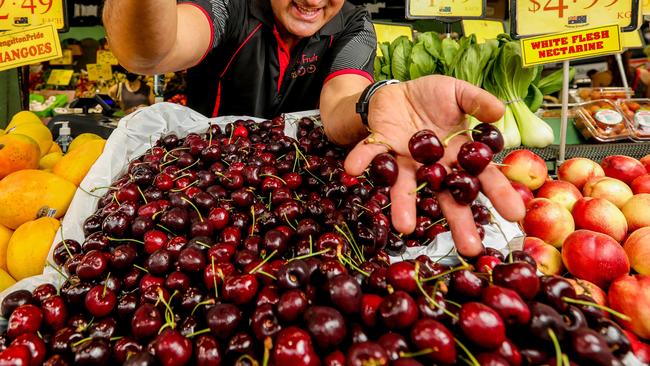
Chilean cherries, followed closely by Australian, make up the bulk of China’s cherry imports.
Australia prides itself on its cherries being on the tree to market in 72 hours.
The cherries in question were reportedly produced on December 18, 2020.
One Beijing resident told the Global Times that the positive results from the cherries would put her off buying the imported fruit for the rest of the season.
Australia’s Deputy Prime Minister Michael McCormack last week spoke out in defence of Australian cherries saying they were the “red, juicy and plump”.
“Wherever we produce cherries they’re great,” Mr McCormack said.
READ MORE: Have RV, will travel as borders allow during pandemic
Ellie Dudley 1.30pm: Mexico breaks devastating record
Mexico has taken the record for more COVID-19 related deaths in a single day for Latin America, after recording 1803 on Thursday.
The country also recorded its highest number of confirmed new cases, at 22,339.
Since the country carries out among the fewest tests of any big nation, epidemiologists say the real number of cases and deaths is far higher. Mexico only counts coronavirus deaths if the patient had received a positive test.
With 146,174 official deaths from Covid, Mexico is the country with the fourth-highest tally of deaths. At the current pace, it will overtake India for third place within the next two weeks.
READ MORE: New voice proposal to placate both sides
Dow Jones 12.45pm: Anger at China’s response smoulders in Wuhan
In the original centre of the coronavirus pandemic, there is a monument to China’s fight against COVID-19.
The former site of an emergency field hospital that treated hundreds of patients at the peak of the outbreak now hosts an exhibition on Wuhan’s “decisive victory in the battle” against the viral enemy.
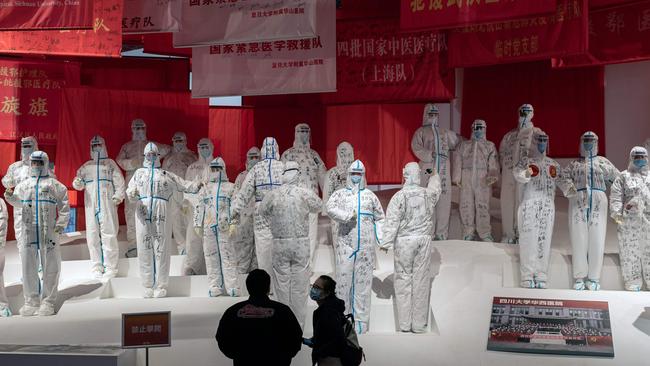
A year after the virus broke out here, though, there is a widespread feeling that the triumphalism is misplaced. For some in Wuhan, there is a sense that it is too soon to declare victory and that the tone is inappropriate. For others, particularly those who lost loved ones at the height of the chaos, there is anger at the government for not acting more quickly and openly.
Read the full story here.
Ellie Dudley 12.39pm: Hungary buys Russian vax as tensions rise
Hungary has announced it is going against the grain and buying two million doses of Russia’s Sputnik V vaccine, as frustrations rise in regards to the EU’s strategy of buying shots in bulk on behalf of members.
“It doesn’t matter if the cat is black or white, as long as it catches the mouse,” Prime Minister of Hungary Viktor Orban said of the different vaccines, despite wariness from some experts over the fact that Sputnik V was rolled out before large-scale clinical trials.
The World Health Organisation continues to warn that richer countries are hogging the vaccine.
On Friday the WHO and pharmaceuticals giant Pfizer announced a deal for up to 40 million initial doses of the Pfizer-BioNTech vaccine to be made available for poorer nations through the Covax global pool.
“We can only end the pandemic anywhere if we end it everywhere,” said WHO chief Tedros Adhanom Ghebreyesus.
A separate deal, brokered by international agencies working with the WHO, will supply developing nations with tens of millions of rapid antigen tests at half the usual $5 price.
READ MORE: Inside Putin’s race to beat the west to a vaccine
Ellie Dudley 12pm: A year on, city springs back to life
Today marks the one year anniversary when Wuhan was first thrown into a 76-day lockdown, after a then-mysterious virus began to take hold of the city.
One by one, adjacent metropolises in the Hubei province quickly followed suit, as did cities and entire countries worldwide as COVID-19 went global.
While the world continues to control the pandemic, Wuhan today has sprung back to life, unrecognisable from the ghost town it was a year ago.
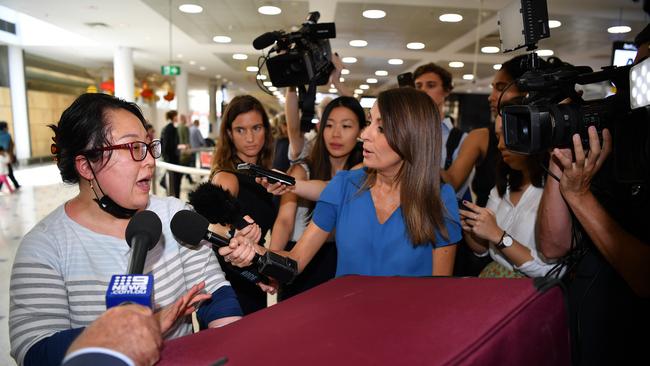
The nation’s capital, Beijing, remains tight-lipped on the pandemic’s early days amid accusations it covered it up or mishandled the outbreak, allowing it to spread.
The virus is generally believed to have spread outward from a Wuhan wet market where exotic animals were sold as food.
But China has otherwise released little information on its origins, fuelling calls in the west for more transparency.
READ MORE: Wuhan goes from ground zero to party central
Ellie Dudley 11.23am: NSW, Queensland record zero new cases
New South Wales have recorded no new locally acquired cases in the 24 hours to 8pm last night.
The state detected one new case which was acquired overseas and is in hotel quarantine.
A total of 11,343 tests were conducted.
Meanwhile, Queensland has recorded no new locally acquired cases of the coronavirus, and one in hotel quarantine.
A total of 5187 tests were conducted, leaving the state with 21 current active cases.
READ MORE: Chris Kenny — A fresh start in 2021? Don’t get your hopes up
Ellie Dudley 11.15am: PM ‘preparing the ground for vax shortage’
Shadow health minister Chris Bowen has accused Scott Morrison of “preparing the ground” for the shortage in the Pfizer vaccine causing delays in the vaccine being delivered into Australia.
After saying Australia was at the “back of the queue” when it comes to receiving the vaccine, Mr Bowne on Saturday said the Prime Minister was “walking away” from delivering the vaccine at the end of February.
Mr Bowen has also reiterated calls for the federal government to take ownership of quarantine.
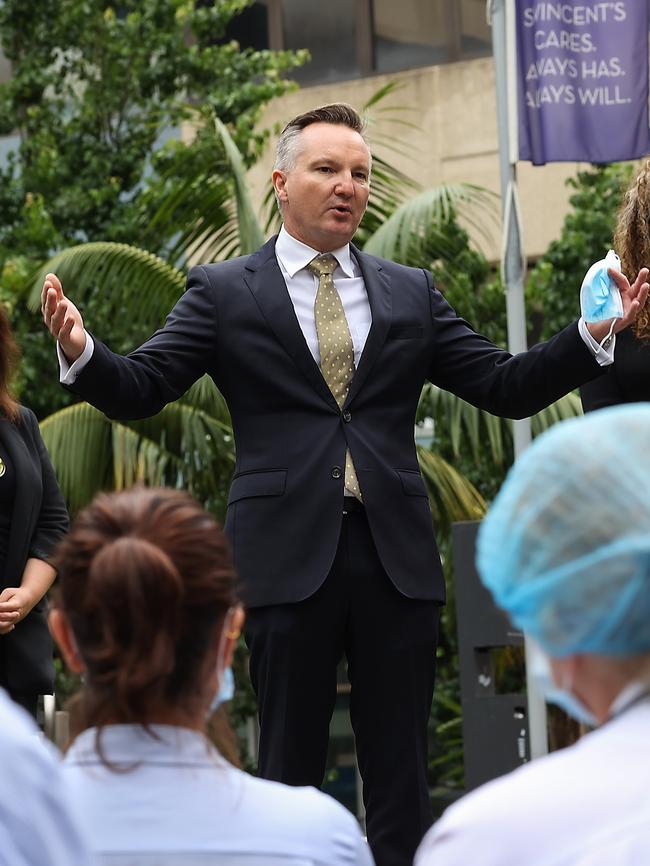
“It is Scott Morrison’s job. It is one of his key performance indicators, and he is failing on it,” Mr Bowen told reporters.
The Shadow Minister has called on the government to lock-in more vaccines and ensure the 10m doses of the Pfizer vaccine on order are delivered as promised.
READ MORE: Vaccine a game-changer for Australia
Ellie Dudley 10.30am: Australians ‘must be patient for vaccine’
An expert in immunisation has said Australia should not be thinking of the vaccine as a way to eradicate the coronavirus, but a way to control it.
Director of the National Centre for Immunisation Research and Surveillance, Professor Kristine MacCartney told ABC News Breakfast on Saturday that it will be a long time before the world is rid of COVID-19.
“This virus has so many properties that mean that anything like eradication is a long way down the track,” she said.
“First and foremost, we have to think about control through vaccination — it is our strongest tool — and through ongoing public health measures.”
Professor MacCartney added the vaccines are “very likely” to protect against severe disease, but Australia “must be patient.”
READ MORE: Double vaccine rollout plan to defeat Covid
Agencies 10.20am: Murray quits AusOpen over ‘unworkable’ quarantine
Former world number one Andy Murray said on Friday he had decided against competing in the Australian Open after failing to find a “workable quarantine” following his recovery from the coronavirus.
Murray has finished his period of self-isolation and had hoped to compete in the first Grand Slam of 2021 in Melbourne.
But the former Wimbledon and US Open champion said he could not find a way of getting to Australia and then quarantining ahead of the tournament’s scheduled start on February 8.
Murray would have had to head to Australia by Saturday to ensure he could observe the mandatory two-week hotel quarantine period.
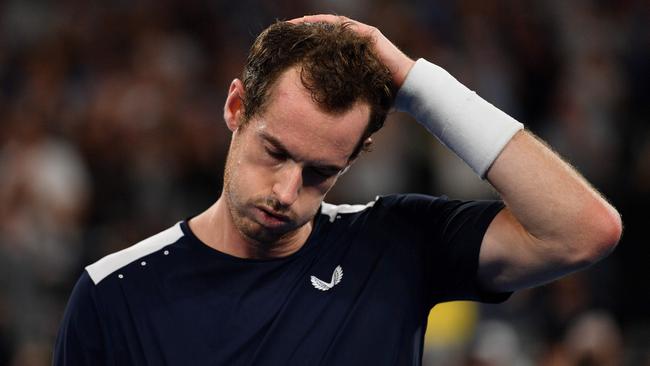
“Gutted to share that I won’t be flying out to Australia to compete at the Australian Open,” Murray said.
“We’ve been in constant dialogue with Tennis Australia to try and find a solution which would allow some form of workable quarantine, but we couldn’t make it work.
“I want to thank everyone there for their efforts, I’m devastated not to be playing out in Australia.
READ MORE: Mixed double-up over tennis quarantine bill
Ellie Dudley 10.10am: Infections soar among Washington National Guard troops
Nearly 200 members of the National Guard deployed to Washington in the days leading up to Wednesday’s presidential inauguration have tested positive for the coronavirus, a Dow Jones report has found.
Some officials fear cramped rest and working quarters contributed to the spread, defence officials said.
Around 26,000 Guard members from all 50 states, three territories and the District of Columbia were deployed following the January 6 attack on the US Capitol to secure the city through the inauguration on January 20.
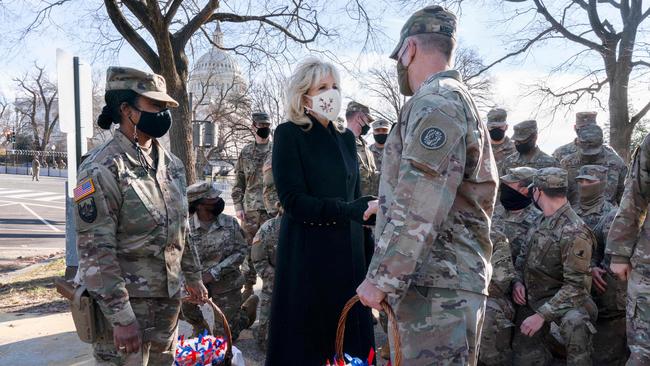
Since Guardsmen arrived at the Capitol in the days following the attack, images have emerged of hundreds of troops inside the Capitol or other sites, sometimes close together and occasionally not wearing masks.
Every Guardsman deployed to Washington was screened for COVID-19 before arriving, but not all were tested, unless required under the screening process, defence officials said.
READ MORE: Trump ‘had a right to make incendiary Capitol speech’
Ellie Dudley 9.50am: UK variant may be deadlier, Johnson warns
The coronavirus variant that has spread across Britain and around the world in recent months could be more deadly as well as more infectious, Prime Minister Boris Johnson said on Friday.
The strain — named B117 — has also spread to more than 60 nations according to the World Health Organisation (WHO).
“In addition to spreading more quickly, it also now appears that there is some evidence that the new variant... may be associated with a higher degree of mortality,” Mr Johnson said on Friday.
He blamed the variant for the grim situation engulfing the UK, where another 1,401 deaths were announced Friday, taking the overall number to 95,981 — the highest in Europe.
Virus deaths in the region have risen 16 percent over the past week, while the number of people hospitalised with COVID-19 is approaching double the number seen during the worst days of the first wave of the pandemic in April.
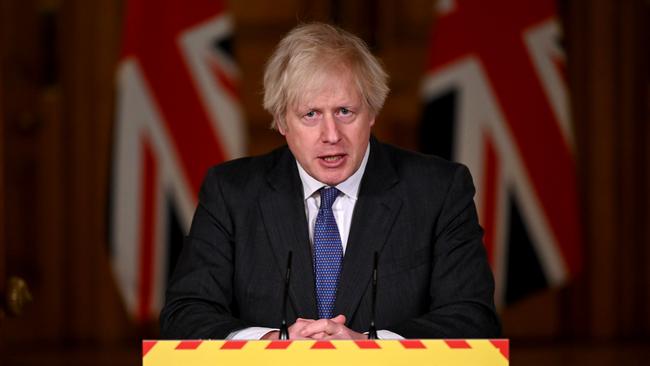
Chief government scientist Patrick Vallance said the new variant could be 30-40 percent more deadly for some age groups, according to an AFP report.
“There’s a lot of uncertainty around these numbers and we need more work to get a precise handle on it, but it obviously is of concern,” he said, flanking Johnson in Downing Street.
“You will see that across the different age groups as well, a similar sort of relative increase in the risk.” However Mike Ryan, executive director of the WHO’s health emergencies program, said it had not yet seen evidence that the variant is more lethal.
“What we are seeing is that if you infect more people, more people will get very sick, and if more people get very sick more people will die,” he added.
“Increasing incidence leads to higher mortality.”
READ MORE: Police probe UK variant spread
Ellie Dudley 9.30am: Pandemic’s pace has slowed
The COVID-19 pandemic slackened its pace around the world over the past week, but Latin America and the Caribbean saw a fresh surge, according to a specialised AFP database.
After hitting a peak, the pandemic slowed down this week with 634,200 new cases recorded on average per day, a 12 percent drop over the previous week, according to an AFP tally up to Thursday.
It was only in Latin America and the Caribbean where the number of new cases continued to rise, up six percent with 120,900 new daily cases. This is the second consecutive week the region registered the highest surge.
All other regions saw new infections drop, with 24 percent fewer new cases in the United States and Canada; minus 17 percent in Africa; minus 12 percent in Europe; and minus two percent in Asia and the Middle East.
This week Europe overtook the US/Canada, recording 221,100 new infections per day, against 196,100. The two regions account for two thirds of the new cases recorded this week around the world.
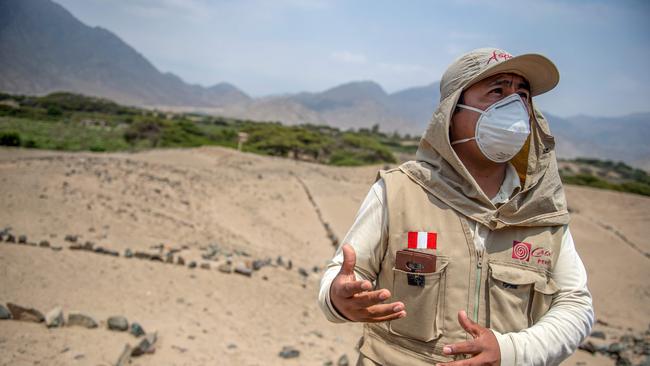
The number of confirmed cases only reflects a fraction of the actual number of infections, as different countries have different counting practices and levels of testing.
On a country level, Peru is where the epidemic is gaining most ground, with 56 percent more infections, or 4,900 new cases per day, among the countries which have registered more than 1,000 daily cases over the past week.
Ecuador is next with 34 percent more, or 1,500 cases; Spain 31 percent, 35,000 cases; Mexico (30 percent, 17,600); and Kazakhstan (29 percent, 1,000).
The biggest decreases were in Ireland with 47 percent less new cases, or 2,700 per day, followed by Hungary with 37 percent less or 1,100; Austria (minus 35 percent, 1,500); Panama (minus 35 percent, 2,100); and Sweden (minus 34 percent, 3,500).
The US again had by far the highest number of new cases with 189,900 per day, but saw a daily decrease of 24 percent. It was followed by Brazil (53,300, up three percent) and Britain (40,500, minus 24 percent).
On a per capita basis Portugal had the most cases with 759 per 100,000 inhabitants.
The US also again registered the most deaths over the past week with 3,073 per day on average, before Britain (1,402), Mexico (1,180), Brazil (1,007), and Germany (843).
READ MORE: PM open to quarantine camps proposal
Ellie Dudley 9am: Victoria records zero new cases
Victoria has reported 0 new locally acquired cases of the coronavirus in the past 24 hours to midnight.
Three new cases of overseas acquired infection were found, all in hotel quarantine.
The state conducted 15,711 tests yesterday.
READ MORE: Katrina Grace Kelly — Melbourne is back after a rough trot
Agencies 8am: Covid to kill ‘well over 600,000’ in US: Biden
President Joe Biden said Friday the COVID-19 death toll in the United States, the world’s hardest-hit country in the pandemic, is expected to top 600,000.
“The virus is surging. We’re 400,000 dead, expected to reach well over 600,000,” he told a news conference, giving his highest estimate yet for the US outbreak’s eventual death toll.
“Families are going hungry. People are at risk of being evicted. Job losses are mounting again. We need to act,” Biden said, before signing executive orders targeting the food crisis affecting millions of Americans.
Biden spoke as the United States topped 410,000 coronavirus deaths, with 24.6 million confirmed infections since the outbreak started.
READ MORE: Cameron Stewart — Biden faces an uphill battle
Tessa Akerman 6.30am: Badosa mea culpa as hard quarantine justified
Spanish tennis star Paula Badosa’s positive COVID-19 test is “proof” Victoria’s hard quarantine of more than 70 tennis players was necessary, Chief Health Officer Brett Sutton has said.
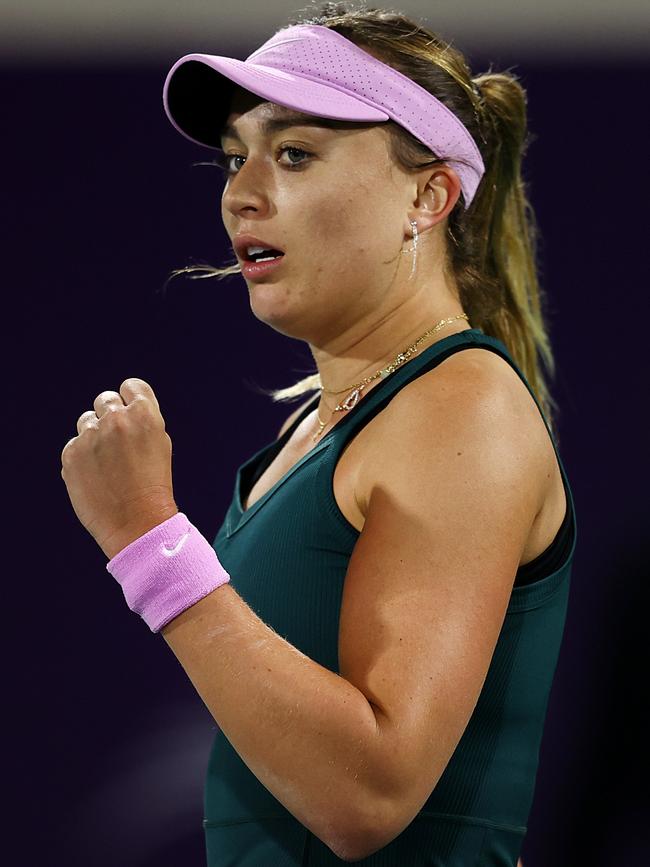
The world No 67 has been moved to a health hotel after testing positive on Thursday, and told her Twitter followers that she was “feeling unwell” and had some symptoms. Badosa was on the same flight from Abu Dhabi as Sylvain Bruneau, coach of Canada’s 2019 US Open champion Bianca Andreescu, who has also tested positive.
Professor Sutton said she would undergo at least 10 more days of quarantine or 14 days if she has the more infectious UK variant. “It’s certainly proof hard quarantine measures were necessary,” he said.
He said the government had quarantined everyone on the flight and although the approach had been questioned, it was “entirely appropriate and has been borne out by this”.
Badosa had previously criticised the tough quarantine measures, claiming the rules had changed overnight about all passengers on a flight quarantining if one passenger tested positive.
On Friday she said “health will always come first” and she felt grateful to be in Australia.
Please, don’t get me wrong. Health will always comes first & I feel grateful for being in Australia. Quarantine & preventive measures are pivotal right now. I talked about rules that changed overnight but I understand the sad situation we are living. Sorry guys. Stay safe. Iâ¤ï¸ðŸ‡¦ðŸ‡º
— Paula Badosa (@paulabadosa) January 21, 2021
Read the full story, by Tessa Akerman and Courtney Walsh, here.
Jacquelin Magnay 5.30am: Tokyo Olympic officials wait on COVID-19 vaccine
International Olympic officials have given themselves a six-week window before reassessing if the Tokyo 2020 Olympic Games will go ahead in July, wanting to see the impact of the vaccination programs rolling out around many parts of the world.
But if the Tokyo Olympics are cancelled, it could imperil the 2032 Queensland bid as the Japanese could be offered those Games, the next available slot behind the 2024 Paris Olympics and the 2028 Los Angeles Olympics.
Olympic sources have told The Weekend Australian the beginning of March is a critical period for organisers to make a final decision about Tokyo.
This is because the Olympic torch relay, involving 10,000 runners, will begin in late March and travel around Japan until the Games opening ceremony in Tokyo on July 23.
Olympic officials wait on vaccine https://t.co/Nxw2qToWio
— Jacquelin Magnay (@jacquelinmagnay) January 22, 2021
Read the full story here.
Joe Kelly 5am: Glimmer of hope for more support for tourism industry
Tourism Minister Dan Tehan has opened the door to targeted financial support for tourism businesses exposed by the loss of international visitors during COVID-19.
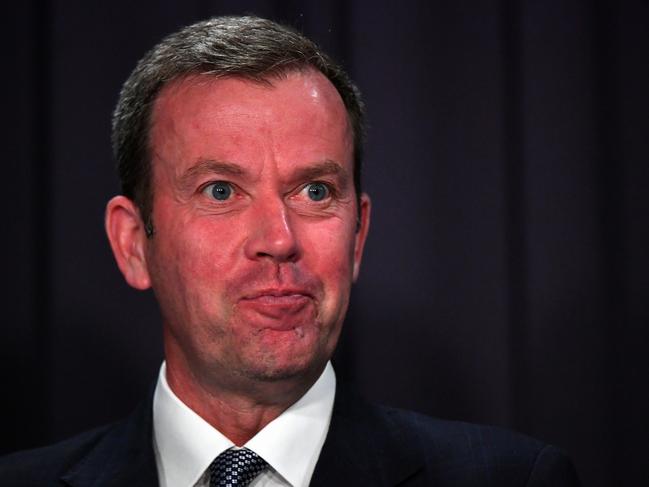
But he has asked the sector to justify any further assistance with hard evidence and provide ideas on how it could be delivered.
Mr Tehan said the reopening of international tourism was still at least nine months away but was hopeful of establishing travel bubbles in the interim with New Zealand, Singapore and other Pacific nations.
“That would give us some opportunity to open up Australia to international tourism, but the most likely scenario is that we are probably nine to 12 months away from international tourism as we know it restarting and it could be not until this time next year. So it’s a very challenging time,” he said.
Read the full story here.


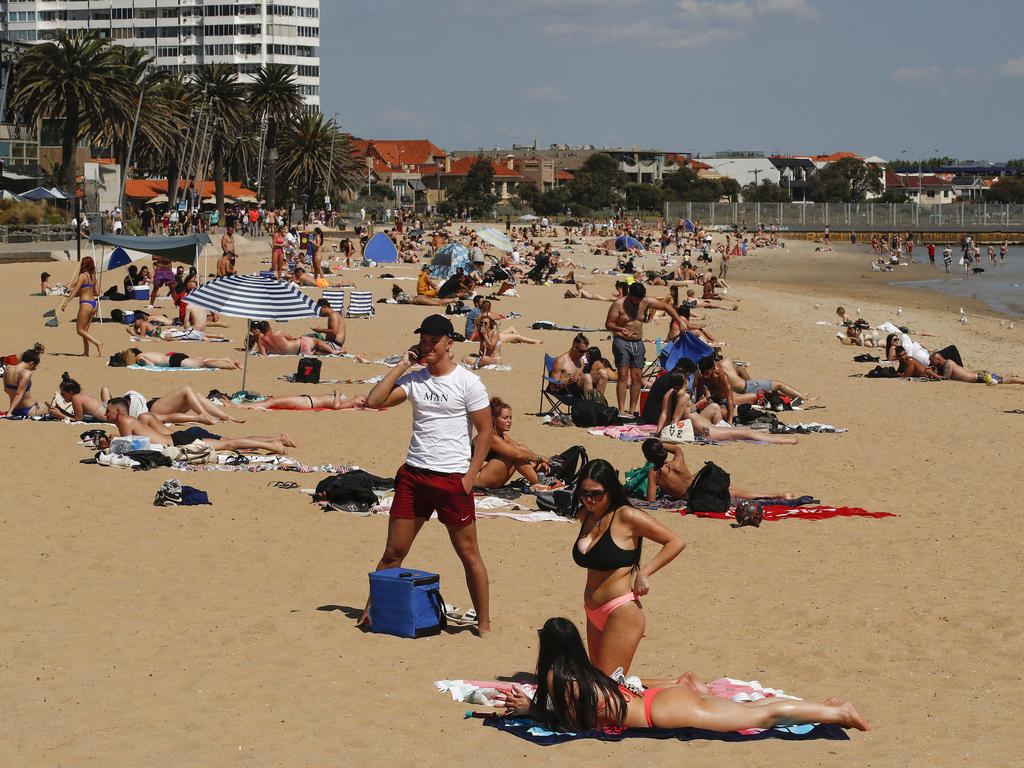


To join the conversation, please log in. Don't have an account? Register
Join the conversation, you are commenting as Logout